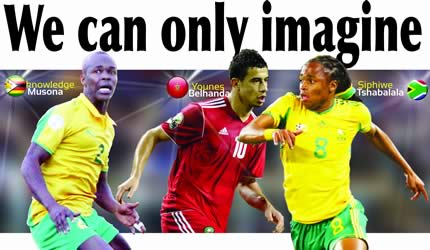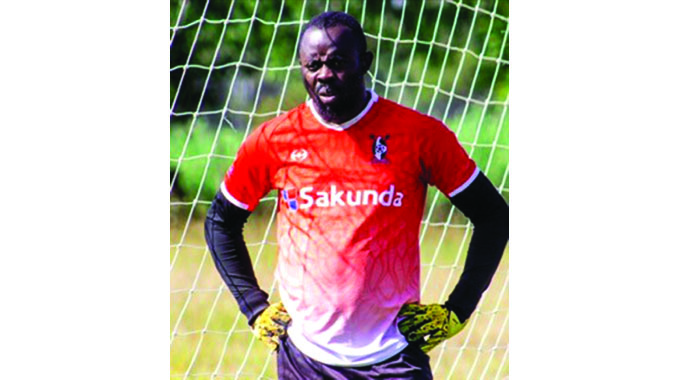We can only imagine

in the Battle of Luanda last October.
The Palancas Negras open their Nations Cup account against the Atlas Lions in the second match of an opening-day Group A double header at Soccer City, where this tournament starts, and also ends, on February 10.
Given the painful way the Angolans elbowed the Warriors out of a place at this Nations Cup finals, riding home on the strength of the away goals rule following a 3-3 deadlock in the thrilling showdown, it’s normal that every move they make in South Africa will remind us of what might have been.
What might have been if the Warriors had not allowed the Angolans to steal that priceless away goal at Rufaro, which breathed life into a campaign that had looked dead and buried in a horror first 45 minutes, when the visitors found themselves 0-3 down to the rampant hosts?
What might have been if the Warriors had emerged out for the second half, of that contest at Rufaro, with the same business approach that had seen them roll over the visitors and score three times without reply to leave them shell-shocked by the blitzkrieg?
What might have been if the Warriors had held their nerve, in Luanda, and not conceded those two early goals, scored by Manucho, which settled the home crowd, and the contest, opening the door for the Angolans and closing one for our boys?
Or what might have been if we had scored in Luanda, which would have changed the picture dramatically, and given us the edge?
There was very little to separate the Warriors and the Palancas Negras in their two-legged showdown for a place at the 2013 Nations Cup finals.
Zimbabwe completely dominated the first half of their showdown, and could have scored more than three goals if they had taken all their chances against a shaky opponent, and the 3-0 lead was full value for the way Rahman Gumbo’s men performed in those 45 minutes.
Khama Billiat was simply awesome, in that first half, playing his game at a level that was higher than his opponents and was the creative hub of the Warriors’ finest moments in that first period of action.
The Angolans were better in the second half, after the introduction of Manucho, but they never dominated the game and Zimbabwe could have avoided the silly goal they conceded, leading to the injury that would keep skipper and ’keeper, Tapiwa Kapini, out of the second leg.
In Luanda, the Angolans came out firing from all angles and got their two early goals but from there, it was anyone’s game, and in the second half, especially after ‘keeper Ariel Sibanda had made some great saves, there were some openings for the Warriors.
In the end, the away goal scored by the Angolans in Harare, turned out to be the deciding moment and, for the umpteenth time, the Warriors agonisingly came short and blew away a golden chance of returning to the Nations Cup for the first time in seven years.
Now, as the big boys of African football take their places at the biggest football festival of them all on the continent, millions of Zimbabwean fans can only wonder about what might have been.
Had we qualified ahead of Angola, and ended up in Group A, we would have faced hosts South Africa, Cape Verde and Morocco for one of the two places into the quarter-finals.
It’s a fair group and the Warriors would certainly have fancied their chances against Bafana Bafana, because the South Africans don’t strike any fear into our players, and there would be as many supporters of the home team, in the stadium, as those for Zimbabwe.
The last time the two teams met, in a friendly international at Rufaro on November 15 in 2011, the Warriors emerged 2-1 winners with Knowledge Musona scoring twice.
“I think we always have a chance when we play South Africa because there are a lot of players, on either side, who are familiar with each other and the boys go into that match without any fears,” former Warriors’ coach, Norman Mapeza, who was in charge in that win in a friendly international, said.
“Then there is also the factor of our fans down there who would have created a carnival atmosphere inside the stadium and pushed the boys to go that extra mile.
“It’s unfortunate that we didn’t make it and let those fans down because this would have been one of their finest moments and I feel we would have competed very well against Bafana Bafana.
“South Africa are trying to build a team and that would have given us a chance and you look at Group A, the other teams like Cape Verde and Morocco, I think we had a good chance of not just making up the numbers but even going to the quarter-finals.
“We played Cape Verde for the 2012 Afcon and they beat us in their home ground and the game here ended in a draw but I feel we would have done better than them if we had met them in South Africa.
“They did well to eliminate Cameroon but in the two games we played against them, I always felt that, technically, we were the better side and we were our worst victims because we conceded some silly goals there and we were not focused here when we played them.”
Morocco have always given the Warriors a problem, although they have never met on neutral ground, and the last time they battled was during the qualifiers for the 2008 Nations Cup finals.
The Atlas Lions held the Warriors to a draw at Rufaro and then won 2-0 in Casablanca to top a group that also included Malawi.
Mapeza was brought in for Charles Mhlauri, to take charge of the final dead rubber against Malawi at Barbourfields, and inspired his team to a 3-1 win.
“Football is changing all the time and I think today in Africa any team can beat any team if they get their cards right and I am quite sure this is an open Afcon, I have been impressed, though by the good organisation that I have seen in the Ghana team, but it’s an open contest,” said Mapeza.
“I always felt this format of us playing four games, directly with our opponents and without having to worry about our destiny being influenced by results from other group matches, offered us the best route back to Afcon finals and we had to play four games and decide our fate.
“Of course, it’s painful that we missed out, especially when you consider that it all came down to away goals rule, and you feel for the young players like Khama because they can only get better if they play at such big tournaments against tough opposition.
“You also have to feel about the fans, really, because this feels like a home tournament for us since South Africa is just across the border and many people would have driven into that country to support the team.
“Then you also have the thousands of our fans who live there, it was going to be a crazy atmosphere and it’s unfortunate, really, that we didn’t make it.”







Comments